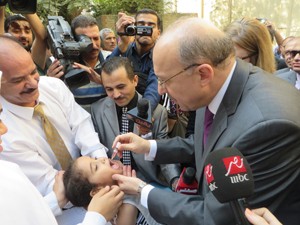
For Immediate Release
Cairo – Today the Egyptian Ministry of Health and Population began phase two of the National Polio Immunization Campaign to provide the second dose of polio vaccinations to 14.3 million children under the age of 5. The U.S. government through the U.S. Agency for International Development (USAID) is supporting the logistics and operations of the campaign to help Egypt sustain its polio-free status.
“USAID is working side by side with the Egyptian people to prevent polio from returning to Egypt,” said Dr. Mary C. Ott, USAID/Egypt’s Mission Director. “Routine immunization and national immunization campaigns like this one provide additional protection for Egypt’s children and help prevent polio’s return.”
Two doses of oral polio vaccine protect young children from being infected with this crippling disease. The last case of polio in Egypt was in May 2004 and it was declared a polio-free country in 2006. Since then, no single case of polio is being detected in Egypt; however, the total number of cases globally has increased in recent years and 75 percent of reported cases are in the eastern Mediterranean region. The Ministry of Health and Population is conducting two rounds of a national polio immunization campaign this year, in April and October.
Over the past thirty years, the U.S. government through USAID has worked with the Egyptian people to achieve significant, positive results. In addition to helping to eliminate polio, the American people have contributed to infrastructure projects that have provided water, electricity, and telephone services to nearly all of Egypt; education projects that have contributed to doubling the number of girls in schools; and health projects that have led to an 80 percent reduction in infant mortality.







Comment
Make a general inquiry or suggest an improvement.